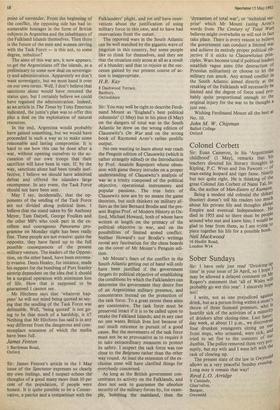Sir: You may well be right to describe Ferdi- nand
Mount as 'England's best political columnist' (1 May) but in his piece (8 May) on the dangers of total war in the South Atlantic he drew on the wrong edition of Clausewitz's On War and on the wrong book of Raymond Aron's rather prolific output.
No one wanting to learn about war reads the Penguin edition of Clausewitz (which is rather strangely edited) or the Introduction by Prof. Anatole Rapoport whose obses- sion with game theory intrudes on a proper understanding of Clausewitz's analysis of war as a trinity composed of the political objective, operational instruments and popular passions. The true heirs of Clausewitz now are by no means the game theorists, but such thinkers on military af- fairs as the late Bernard Brodie and the pre- sent Regius Prof. of Modern History at Ox- ford, Michael Howard, both of whom have written at length on the primacy of the political objective in war, and on the possibilities of limited armed conflict. Neither Howard's nor Brodie's writings reveal any fascination for the chess boards on the cover of Mr Mount's Penguin edi- tion.
Mr Mount's fears of the conflict in the South Atlantic getting out of hand will only have been justified if the government forgets its political objective of establishing the conditions by which the Falklanders can determine the government they desire free of an Argentinian military presence, and concentrates instead on the protection of the task force. To a great extent these aims are coextensive. The task force must be preserved intact if it is to be called upon to retake the Falkland Islands; and in any case no one wants British lives lost because of too much reticence in pursuit of a good cause. But the movements of the task force must not be so provocative as to require it to take extraordinary measures to protect its safety. I suspect the task force was too close to the Belgrano rather than the other way round. At least the extension of the ex- clusion zone will have clarified things for everybody concerned.
As long as the British government con- centrates its activity on the Falklands, and does not seek to guarantee the absolute security of the military forces by, for exam- ple, bombing the mainland, then the 'dynamism of total war', or 'technical sur- prise' which Mr Mount (using Aron's words from The Century of Total War) believes might overwhelm us will not in fact take place. There is every reason to believe the government can conduct a limited war and achieve its entirely proper political ob- jective if it sticks to Clausewitzian prin- ciples. Wars become total if political leaders establish vague aims (the destruction of Prussian militarism) or choose to let the military run amok. Any armed conflict in
the South Atlantic aimed directly at the retaking of the Falklands will necessarily be limited and the degree of force used pro- bably quite proportional enough to the original injury for the war to be thought a just one.
Wishing Ferdinand Mount all the best at No. 10.
John M. W. Chipman
Balliol College Ox ford






































 Previous page
Previous page